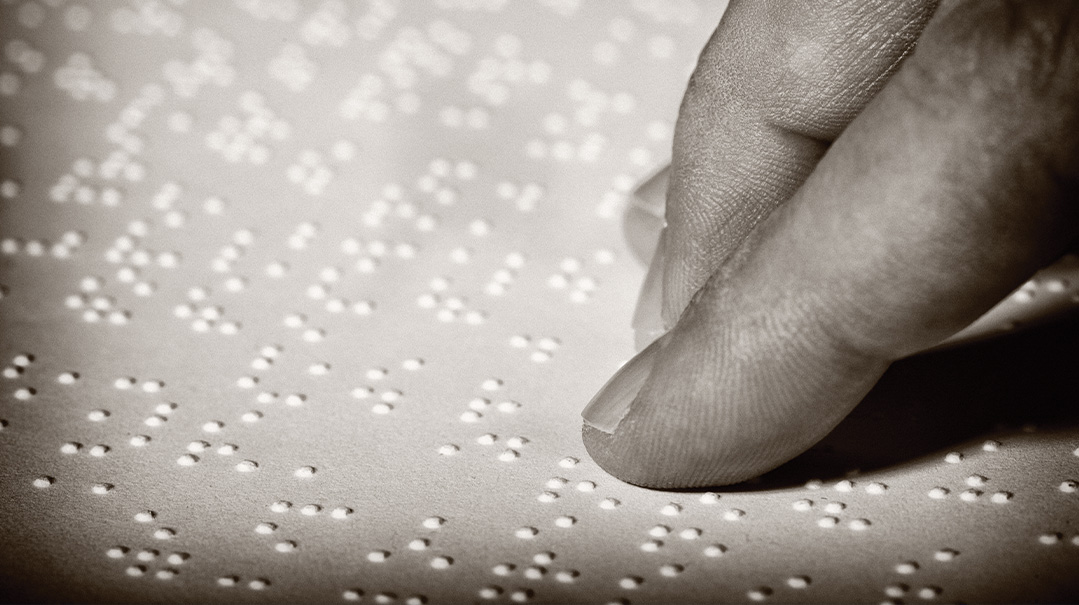Reading the Signs

Determined to avoid the problem, I did the only thing I could think of — I started to act up in class

This story is something I haven’t told many people. In fact, apart from my family and close friends, very few know about it at all. Mostly, I’m known as a relaxed, happy kind of teen, comfortable with my small circle of like-minded friends. But there is one thing which has always set me apart. It makes me blush just telling you about it, admitting that something so seemingly simple can be such a huge challenge. But it is. Because no one wants to reach 15 years of age and still struggle with reading Hebrew, and frankly, it was embarrassing. Which is why I made sure no one knew.
I started school in first grade, on par with my classmates. I learned the alef-beis alongside my friends, thrilled to add each letter to the huge alef-beis train which my mother hung up in my bedroom. I’m not quite sure when reading started to become a struggle, but it did. Not in English, where I was devouring books by the dozen. Just in Hebrew, where my classmates were reading sentences with a fluency I could only envy. At first, I did what my teachers told me, painstakingly reading out words one by one, encouraged by a teaching assistant. They gave me different paragraphs to read each day, but it took me so long to get through each sentence that I usually ended up reading about five pesukim of Tehillim over a week. Sadly, after a while, that’s all they’d expected from me.
My teachers must have spoken to my parents at PTA because at some point there were suddenly reading charts on our refrigerator and a new large-print Tehillim on the bookshelf. My parents tried to make it more enjoyable, playing games at the end of each line, putting stickers on the chart, but eventually it all lost its charm. My reading stagnated, until at one stage, my progress ground to a complete halt. By that point, I was eight years old, and my teachers were starting to call on girls to read out loud in class. Each day I would sit, quaking, dreading the time I would be called on to read, and when I was… well, it was painful. Slow, and full of mistakes. Each word took superhuman effort, and eventually I realized that it wasn’t going to get any better. So I stopped trying.
At home, things were happening, one after the other. Most significantly, my mother experienced a difficult pregnancy, and she was stuck in bed for three months. I gratefully took advantage of the excuse of “helping” her take care of my siblings, while the Tehillim gathered dust on the bookshelf. Sure, sometimes she would ask me if I had kriah homework, but I told her I would do it myself, and she really had very little strength to pursue it. My reading was abandoned.
Meanwhile, in school, I had multiple schemes to escape kriah time. Sometimes I’d conveniently go to the bathroom, and some days I’d just whisper the words so quietly that no one would hear the mistakes I was making, or even realize I was reading the wrong pasuk. To further complicate matters we got a new teacher midyear. And somehow, between all of this, the little girl who could not read was forgotten.
I don’t blame anyone for what happened. After all, with all these circumstances surrounding me, together with my strong desire to hide the issue, it was difficult to detect. As I grew older, I upped my game, and constantly found better and better ways to get out of reading Hebrew. And then came high school.
The first few weeks in my new school were filled with anxiety. Suddenly, I was pushed way out of my comfort zone, and I knew it would only be a matter of time before my Chumash or Navi teachers found out my guilty secret. Determined to avoid the problem, I did the only thing I could think of — I started to act up in class. Yes, out of character, I can hear you thinking, but pride makes us do all kinds of things, you know, and this is how I chose to deal with the issue.
I could spend hours talking about all the tricks and antics I thought up, but I’d prefer to leave those alone right now. They weren’t really me, I know that, but at that point I was so confused and anxious that it was the only way out. It’s funny because you would have thought someone would have noticed how differently I behaved in a math lesson or even in English. In those periods, I was usually one of the calmer students, concentrating on my work and achieving decently. But Chumash? Forget it.
And that is how I continued throughout my high school years. There were times when things were easier; other times, things got hard. Like any high school kid, I had my share of social problems to deal with, and between Chesed and Production and scraping my way through finals, there was plenty to distract me from my challenge. Yomim Noraim were always my biggest nightmare as I stood in shul, sneaking glances at my neighbor’s page numbers while trying to read hundreds of words which all looked like one big blur. One year I even remember reading the entire Yom Kippur Mussaf in English to myself, not even bothering to attempt the Hebrew. Hashem can understand any language, I reasoned, English is just as good.
I know it sounds lame now. I can see so clearly how crazy it was that I kept on kidding myself, pretending, denying, anything to avoid the pain of dismal failure.
I could have stayed this way for the rest of my life, fudging my way through, sometimes more successfully than others. But Hashem has His ways and when I was 15 years old, He decided it was time for change. How it happened was simple enough. First, I was given the job as Chesed Head in school, which meant that I suddenly found myself arranging countless events and activities to raise money and help local organizations. One of these events was a Chinese Auction.
I worked for weeks, planning and preparing, until the day arrived. The auction was planned to a tee, with fabulous prizes and a beautifully decorated auditorium. Five minutes before the program was due to start, my friend, Ruthie, ran over.
“Chavi, are you ready to lead the Tehillim?”
“Tehillim?” I heard myself ask, as my stomach started to churn. Because I realized I knew exactly what she wanted me to do.
“Yes, you know! Chesed Head always leads the Tehillim at the auction.”
I felt faint and dizzy. The room spun – first one way, then the other.
“Get me a chair, quick,” I rasped at a bewildered Ruthie.
I still don’t know what suddenly made me break. Maybe it was just the rising tension, and my need for someone, anyone, to finally understand my struggle, but when she came back – chair and cup of water in hand – I told her.
“Ruthie…” I stammered. “I’ve got to tell you something. I can’t lead the Tehillim.” She stared at me, quizzically,with concern.
“Ruthie, I… I… you see, I can’t read…” I burst into tears, minutes before the auction, minutes before I was meant to go on stage and do something which I could never, ever do – not for all the money in the world.
Ruthie called for reinforcements.
“Chavi’s not feeling well,” she told Mira. “Lead the Tehillim, ‘kay?”
“Sure,” Mira said eagerly, and off she went. And then the real talk started. I told Ruthie everything, from beginning to end, and she listened to my every word. Without judging, without interrupting, just listened, until my monologue ended, and my legs started to feel solid again.
“Chavi,” Ruthie said, “I know you’ve kept this a secret all these years, but don’t you think it’s time for you to get some help?” All I could do was nod.
I wish I could tell you that through the help and support I finally got, I’m reading fabulously and helping others, too. The honest truth? I’m not. I still struggle mightily and it’s likely that I’ll never be as quick and capable as most girls my age are. But, I can say that with my (shocked, but supportive) parents on board, and a new kriah specialist who guides me weekly, I can at least read a page of Tehillim – albeit slowly – and that is something I never thought I would be able do.
The odd thing is that no one is really sure where my problems stemmed from, and why I struggle so much more with reading Hebrew than with English. Even with my steady improvement, perhaps we’ll never know. But most importantly, at least now I can live with the knowledge that I’ve chosen to face the challenges which Hashem has sent my way. Because that’s what He wants, isn’t it?
(Originally featured in Teen Pages, Issue 801)
Oops! We could not locate your form.












